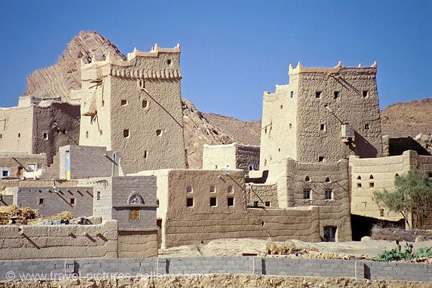
Traditional buildings in Sa‘da, Yemen
Over the past few years a major civil war has been simmering, at times brewing over into neighboring Saudi Arabia, in the north of Yemen. It has been called the al-Huthi rebellion and much of the fighting took place around the historic town of Sa‘da, the main entry of the Zaydi imams in the 10th century C.E. The exquisite travel text of Ibn al-Mujâwir, penned and quilled in the early 13th century, has a brief account of the overall region. Here is what Ibn al-Mujâwir, as ably translated by G. Rex Smith, said:
A description of these areas. The [previous] informant, [al-Kirmani], informed me as follows: All these areas [are made up of] settlements similar in size to one another to a greater or lesser degree. Each settlement has its own people. Every Arab tribal group and even bedouin section is [represented] in a settlement. As a result of their behaving badly [towards others], no one can settle with them, either on a temporary or a permanent basis.
A stronghold of stone and plaster has been built in every settlement and everyone living in the settlement has a store in the stronghold in which he keeps all his possessions, taking only from it what he needs on a daily basis. the inhabitants of the settlement surround the stronghold on all four sides. Each settlement is ruled over by an old shaykh of some power, clever and intelligent. When he gives a ruling, no one else shares in, nor opposes, what he advises them to do and what judgement he gives. There is no other authority ruling over all those in these areas and they pay no tax, nor do they hand over any levy at all, except whatever one wishes. thus they are constantly fighting, one getting the better of another’s wealth and the relatives of Zayd taking the wealth of ‘Amr. They do this all the time.
Their crops are wheat and barley; their trees are vines, pomegranates and almonds. All [kinds] of fruits and choice things are to be found among them. Their food is ghee and honey and they [bask] in their God[-given] ease and security. They are tribes who go back to Qahtân and others in their family trees.
Quoted by Ibn al-Mujâwir in his early 13th century travel text, translated by G. Rex Smith, A Traveler in Thirteenth-Century Arabia: Ibn al-Mujâwir’s Târîkh al-Mustabsir (London: The Hakluyt Society, 2008), p. 65.